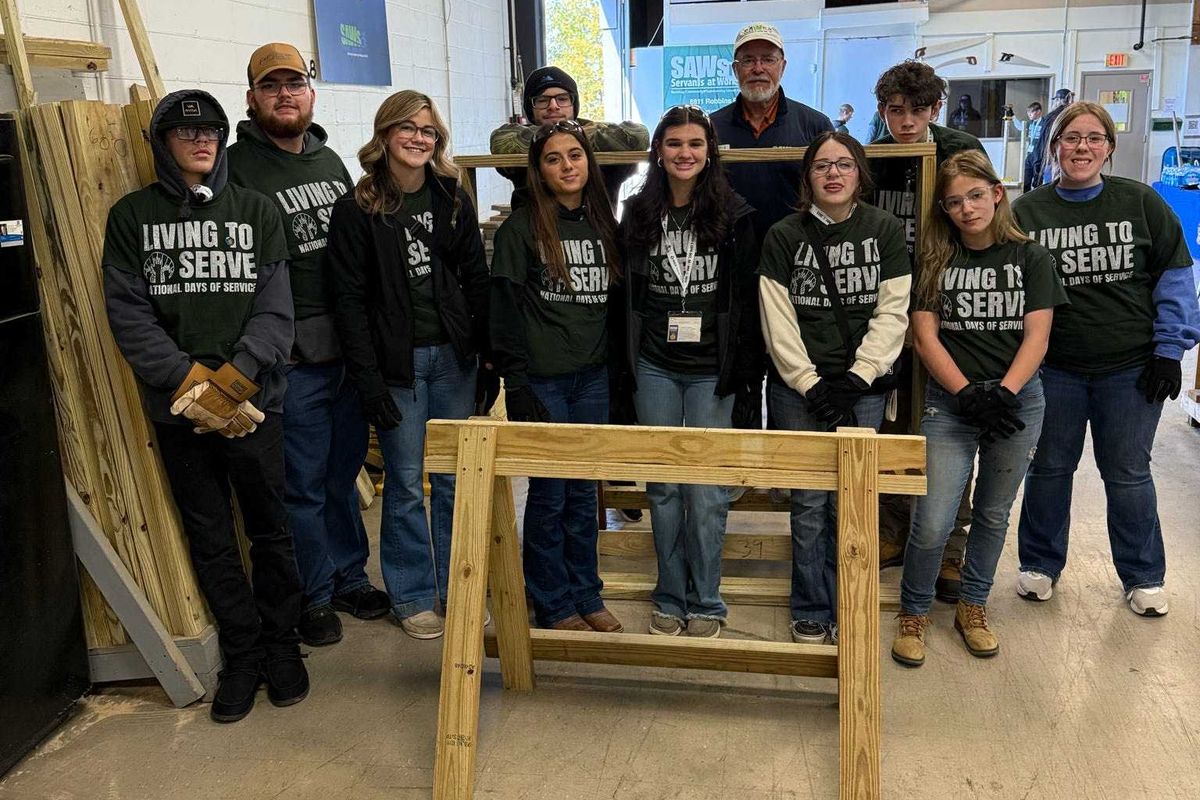Latest News
GNH football wins third game in a row
Nov 12, 2025
File photo
WATERBURY — The Gilbert/Northwestern/Housatonic co-op football team record improved to .500 after defeating Waterbury Career Academy 16-12 on Saturday, Nov. 8.
It was the third consecutive win for GNH. After bouncing back from a 1-4 start, the Yellowjackets moved into fourth place in Naugatuck Valley League standings.
Two games remain for the Yellowjackets: at home Saturday, Nov. 15, against Holy Cross High School (5-3) and then away at St. Paul Catholic High School (2-5) for the Turkey Bowl on Wednesday, Nov. 26.
Keep ReadingShow less
Housatonic Valley FFA built wheelchair ramps for homes during the FFA convention.
Provided
A group of 18 Housatonic Valley FFA students, joined by two American Degree recipients, two chaperones and four advisors, took part in the 98th National FFA Convention in Indianapolis, Indiana, Oct. 29 to Nov. 1.
The event brought together 73,000 FFA members from across the country to compete, learn and celebrate agricultural education.
Four Housatonic students - Hannah Johnson, Madison Melino, Darwin Wolfe and Kellie Eisermann - competed in the horse evaluation competition, where the team won a bronze placement. The nursery landscape team, made up of Byron Bell, Hayden Bell, Madeline Collingwood and Michael Gawel, earned a silver placement overall in their competition.
In the leadership development events, Zayre Trail competed in the Creed Speaking with an overall bronze placement. Riley Mahaffey, in her third national public speaking event, advanced to the semifinals in Extemporaneous Speaking. Tyler Anderson represented our chapter by applying for and receiving a two-star national chapter award.

Two recent HVRHS alumni, Emma Crane and Will Star, earned their American FFA Degrees. The American Degree is the highest degree an FFA member can achieve, recognizing exceptional leadership and dedication to agricultural education and supervised agricultural experience projects.
In addition, Levi Elliott and Daniel Moran were honored with the Brian Parker Award, sponsored by the Housatonic Valley FFA Alumni. This award is given to hardworking members who have not yet had the opportunity to attend the National Convention.
Other chapter representatives included Hayden Bachman, Christopher Crane, Daphne Paine, Logan Padelli and Taylor Green, who were all recognized for their dedication and involvement in FFA activities.
During the trip, students participated in “Days of Service,” including projects with Servants at Work (SAWS) to build wheelchair ramps for homes, volunteer in food kitchens and organize clothing donations. Members also attended leadership workshops to strengthen their leadership skills.
Students participated in other fun activities such as a rodeo with broncs and bull riding, a concert by Ernest and Ella Langley and of course the National Convention Expo, which is always a big hit. They also attended sessions at Lucas Oil Stadium, featuring keynote speakers, retiring addresses from national officers and performances from FFA talent shows.
Our chapter’s goal was to exchange information from different chapters across the country to set up exchange trips in the future.
Overall, everyone had a great time competing, meeting new members from across the country, and making unforgettable memories.
Kellie Eisermann is the FFA Reporter this year. She is a junior and lives in Lakeville.
Keep ReadingShow less
A hearty ‘Welcome Home’ to our veterans
I think most of us know that Veterans Day originated to commemorate the end of WWI on November 11, 1918.It was changed to honor veterans from all wars in 1954, but who are these folks?Some join the military to honor family tradition. Some are looking for order out of backgrounds that were ‘less than ideal’.I know two generals who joined the military to go to medical school, and they did.Whatever the reason, all knew that they were also serving something beyond their own ambitions.
Having come to know many of these men and women I now understand that beneath the medals and uniforms of each is a human being who signed an oath to the Constitution, was willing to go anywhere in the world and agreed to follow orders, from the Commander in Chief to whoever was above them in rank, no quitting, no discussion. And, when they finally come home, the journey of returning to civilian life is a long one.
One other thing I’ve learned is that when you meet a veteran who has come back from any post or any era, give them a hearty, ‘Welcome home.’ I find that to be warmer and more personal than, ‘Thank you for your service’.
So, WELCOME HOME to all of you who signed a blank check that included your own lives to Uncle Sam.
Jane Strong
The Equus Effect
Sharon
Celebrating Lynne Stanton
Two weeks ago, when Lynne Stanton passed away, Salisbury lost a remarkable member of our town and our family lost a dear friend. Lynne created The Hills to help people find items or services, but her readers found in its pages our community and its history as well.Through photos and postcards we discovered that blizzards of legend actually happened, that “gas stations” provided fuel and fixed cars, and that our lakes had the same view we enjoy today.
Lynne’s “community” was more than a publication.She and her husband Bill shared three decades with our mother, Ann Scoville, and helped her live the life of independence and creativity so essential to her spirit.They laughed; they let her be; but they were always nearby.I see, with awe, this personal support aspect of “community” in Salisbury and in family after family. As I celebrate Lynne Stanton, I celebrate our community.
Tom Scoville
Taconic
Ghosting Republicans
The letter (Oct. 30) from Tom Shachtman demonstrates all that is destructive in the views of our so-called “Progressives”.
Mr. Shachtman writes: [N]ow is not the time to trust any local Republican, no matter how qualified a candidate, in public office. Every vote for a local Republican is an affirmation of the national Republican Party’s undermining of our democracy and our way of life.”
Putting aside the fact that over 77 million Americans — including 580 voters in Salisbury, at least 250 of whom were not Republicans — voted for the president and that he is doing pretty much what he told everyone he would do if elected, Mr. Shachtman’s desire to freeze Republicans out of participation in local government raises troublesome issues.
If Salisbury Republicans are to be banned from participating in local government, should we also be banned from holding leadership positions in local organizations such as the Salisbury Association, the Rotary Club, the Ambulance Corps, Music Mountain and countless other organizations where we work alongside Democrats and Unaffiliateds for the good of the community?
And perhaps our participation in the work of various service groups, such as the Lakeville Hose Company, the Ambulance Corps, the Salisbury Winter Sports Authority and Youth Hockey – should also be banned. After all, who wants to have a Republican show up to help put out a fire that threatens to burn down their house? Or provide emergency CPR while you are on your way to Sharon Hospital?
And what about our donations to the dozens of worthwhile organizations that we routinely support?
If Republican money is “tainted” because of the national administration, why would the Lakeville Journal, the Scoville Library, the Visiting Nurse Association, the fire and ambulance corps, and the various Affordable Housing organizations want to accept our donations?
Perhaps the solution to this “progressive” anger is for all Republicans to be required to pin a scarlet “R” on their outerwear whenever they appear in public. That way enlightened Progressives could cross the street whenever they see us coming. And they could avoid sitting next to us in our churches and synagogues and at local restaurants, concerts and school events
Mr. Shachtman, a historian, should be aware of the slippery slope he wishes to lead the citizens of Salisbury down.
Tom Morrison
Chair, Salisbury Republican Town Committee
Lakeville
Keep ReadingShow less
loading









